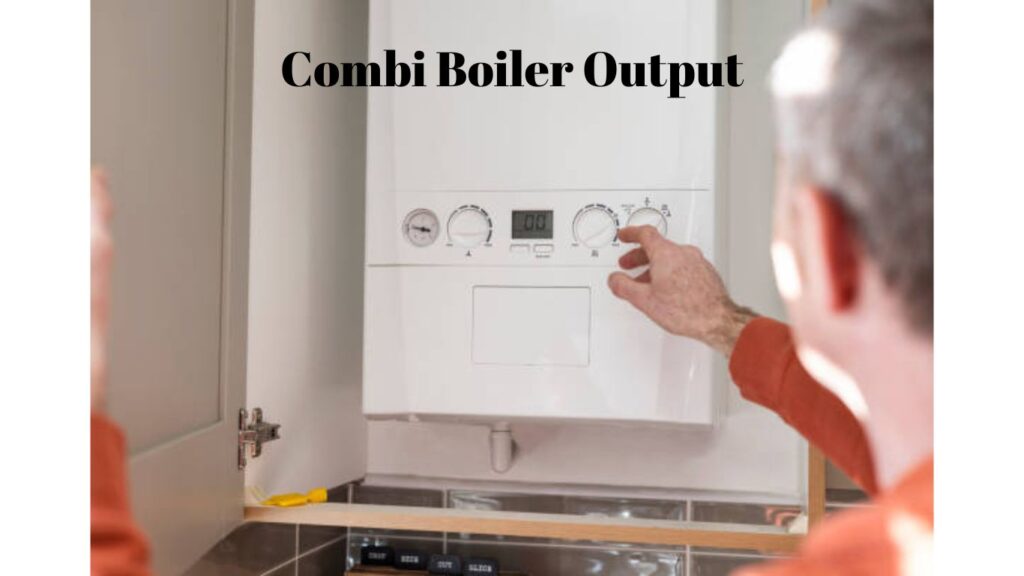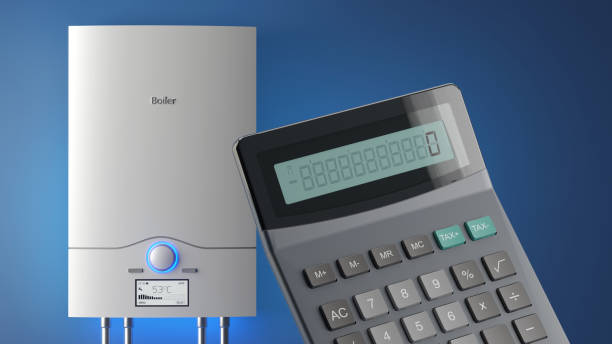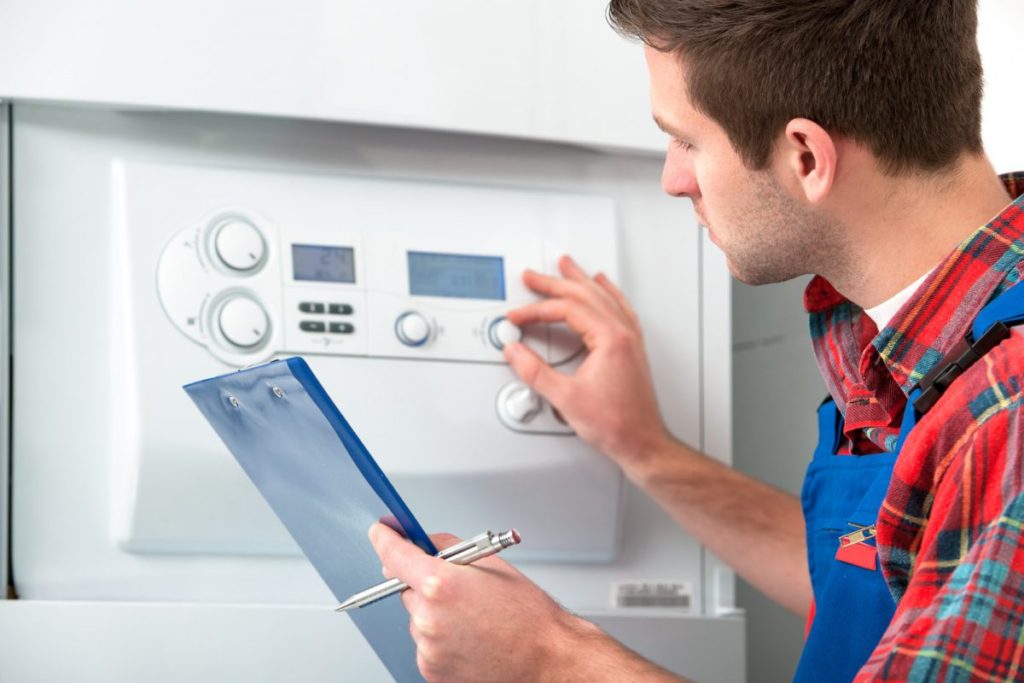
Introduction
Are you looking to upgrade your home heating system or simply trying to understand the importance of combi boiler output? You’ve come to the right place.
In this blog post, we’ll help you navigate through the concept of combi boiler output and its significance in providing efficient home heating. We will explore various factors affecting boiler outputs, how it is measured, and most importantly, guide you on how to choose the perfect size for your home.
Key Takeaways
- Combi boiler output is a measure of how much hot water and heat a combi boiler can generate at any given time, typically measured in kilowatts (kW), and is affected by factors such as the size of your home, heating and hot water requirements, and efficiency.
- To choose the right size combi boiler for your home, it’s crucial to calculate your home’s heating and hot water requirements accurately. Factors like house size, number of bathrooms, radiator size etc., should be considered while deciding on an appropriate output range.
- Selecting a high – efficiency combi boiler with an appropriate output results in efficient heating and hot water supply along with reduced energy consumption and costs. Regular maintenance, correct installation procedures, upgrading to more efficient models are also essential to maintain peak performance levels.
Understanding Combi Boiler Output
Combi boiler output is a measure of how much hot water it can generate at any given time, typically measured in kilowatts (kW), and is affected by factors such as the size of your home, heating and hot water requirements, and efficiency.
Definition Of Combi Boiler Output
Combi boiler output refers to the amount of hot water and heat a combi boiler can generate at any given time, ensuring your home remains warm and comfortable while also providing sufficient hot water for daily tasks such as showering, cleaning, or cooking.
For example, a small apartment with just one bathroom may only need an 18kW combi boiler to fulfil its heating demands. In contrast, a large family home with multiple bathrooms would require a more powerful combi boiler with an output of 40kW or even higher.
How It Is Measured
Combi boiler output refers to how much hot water it can produce at any given time. The outputs for combi boilers range from 24kW to 40kW, with smaller models starting at around 18kW.
It’s important to note that producing hot water requires more heat and effort than central heating, so the two heat outputs on a combi boiler can vary. Additionally, combi boiler specs include the water flow rate, usually measured in litres per minute (l/min), which determines how much hot water is supplied based on available pressure.
Factors That Affect Output
Several factors can affect the output of your combi boiler, including:
- House size: The larger your home, the more heating and hot water you’ll need, which will require a higher output.
- Heating demand: If you live in colder regions or have high heating demands due to frequent use of hot water, you may need a higher output boiler.
- Radiator size: The larger your radiators, the more heat they will require, which will require a higher output.
- Hot water demand: If you have multiple bathrooms or frequently use hot water simultaneously from different outlets, you’ll need a higher output boiler.
- Installation quality: Poor installation or incorrect sizing can impact the efficiency and performance of your combi boiler’s output.
- Boiler model/type: Different types of boilers offer different outputs and efficiencies depending on their design and technology.
- External factors: External factors such as weather conditions and insulation levels can impact the output required for efficient heating.
Recommended Sizes For Different Homes
Determining the appropriate combi boiler output for your home is crucial for efficient heating and hot water supply. The table below provides a general guideline for selecting the right size combi boiler based on the size and type of your property.
| Property Type | Number of Bedrooms | Number of Bathrooms | Combi Boiler Output (kW) |
|---|---|---|---|
| Flat / Apartment | 1-2 | 1 | 24-27 kW |
| Small Terraced House | 2-3 | 1 | 24-27 kW |
| Medium Terraced House | 3 | 1-2 | 28-34 kW |
| Semi-Detached House | 3-4 | 2 | 28-34 kW |
| Large Semi-Detached House | 4 | 2-3 | 35-40 kW |
| Detached House | 4+ | 3+ | 35-40 kW |
Keep in mind that this table is only a general reference, and it is always recommended to consult with a heating engineer to accurately calculate your home’s heating and hot water requirements. Factors such as insulation, number of windows, and overall square footage may also influence the recommended output size. Additionally, selecting a combi boiler with a modulating feature can help adjust the output based on your home’s current heating and hot water needs, improving overall efficiency.
Choosing The Right Size Combi Boiler For Your Home
To avoid overspending on energy bills or lack of hot water supply, it’s crucial to choose the right size combi boiler for your home by calculating its heating and hot water requirements, understanding BTUs and kW ratings, using a boiler size calculator or consulting with a heating engineer.

Calculating Your Home’s Heating And Hot Water Requirements
To ensure that you choose the right size combi boiler for your home, it is important to calculate your home’s heating and hot water requirements. Here are some steps to get you started:
- Determine the size of your house in square meters or feet. This will give you an idea of how much energy is needed to heat your home.
- Identify the number of rooms in your house that require central heating. Each radiator requires a certain amount of heat output, which needs to be factored into your calculations.
- Consider how many bathrooms you have and the hot water demand from these areas. The more taps or showers you have running at the same time will require a larger output from your combi boiler.
- Look at the insulation in your home, as well as window quality and door seals. Properties with better insulation need less energy for heating.
- Take into account any additional factors such as high ceilings or large windows that may affect heat loss.
- Use an online boiler size calculator or consult a qualified heating engineer to help determine the correct output required for efficient performance.
Calculating your heating and hot water requirements accurately can ensure that you choose a combi boiler with a suitable output for your household’s needs, helping to reduce energy consumption and costs while increasing comfort and convenience levels within your home.
Understanding BTUs And KW Ratings
To choose the right combi boiler for your home, it is essential to understand BTUs and kW ratings. British Thermal Units (BTUs) refer to the amount of heat required to raise the temperature of one pound of water by one degree Fahrenheit.
On the other hand, kilowatts (kW) measure how much energy a unit can generate in an hour.
For example, if you have a 3-bedroom house with 2 bathrooms and need hot water from multiple outlets simultaneously, you’ll want a combi boiler with an output rating of around 28-32 kW.
This will provide enough power to run multiple showers at once without running out of hot water.
Overall when choosing between boilers fitted for your home its important not only consider whether they produce enough heat but also whether they are cost-effective – this extra consideration will increase comfort while keeping bills minimal!
Using A Boiler Size Calculator
It can be overwhelming to determine the right combi boiler size for your home. Luckily, there are online boiler size calculators that can help simplify the process.
One popular calculator is the British Gas Boiler Calculator which takes just a few minutes to complete. It considers several factors including the number of bedrooms in your home plus other specific details like radiator size and bathroom needs.
Consulting With A Heating Engineer
Choosing the right size combi boiler for your home can be a daunting task. If you’re not sure which size to opt for, consulting with a heating engineer can help you make an informed decision.
A heating engineer will assess your home’s hot water and heating requirements, including the number of bathrooms and radiators in your property. They’ll also take into account factors such as insulation levels and any plans to extend or renovate your property in the future.
For instance, suppose you reside in a three-bedroom house with one bathroom having two adults living in it; choosing a 24kW combi boiler may suffice comfortably while installing multiple shower heads could require opting for an upgraded version capable of maintaining heated water supply without fluctuations.

Benefits Of Choosing The Right Combi Boiler Output
Choosing the right combi boiler output for your home can result in efficient heating and hot water supply, reduced energy consumption and costs, increased home comfort and convenience, as well as lower carbon emissions.
Efficient Heating And Hot Water Supply
Choosing the right size combi boiler for your home can lead to efficient heating and hot water supply. A properly sized boiler will be able to meet the heating demands of your home, providing a constant flow of hot water whenever you need it.
This means no more waiting for the shower to warm up or filling up the kettle just to have enough hot water. By having a combi boiler with an appropriate output, you can also reduce energy consumption and costs as it won’t be overworking or overheating your home’s heating system unnecessarily.
Reduced Energy Consumption And Costs
Choosing the right combi boiler output can significantly reduce your energy consumption and save you money on utility bills. Oversized boilers tend to waste energy since they consume more gas than necessary to heat your home or provide hot water.
Smaller-sized heating systems, on the other hand, may struggle to keep up with demand, leading to higher running costs in the long run. By investing in a combi boiler with an appropriate output for your property size and heating demands, you’ll not only enjoy better comfort but also cut down on carbon emissions.
For instance, if you live in a one-bedroom flat with only one bathroom and don’t have many radiators, a 24kW combi boiler might be sufficient. A larger house with multiple bathrooms will require a bigger boiler output of around 35kW or higher.
Increased Home Comfort And Convenience
Choosing the right combi boiler output size can significantly increase your home’s comfort and convenience. With a properly sized combi boiler, you can enjoy a consistent supply of hot water at the temperature you desire and heat all of your rooms to the desired temperature.
No more cold showers or uneven heating throughout your home! Plus, with modern, high-efficiency models available, you can also save money on your energy bills while enhancing comfort.
For example, upgrading from an older model to a new A-rated condensing combi boiler could reduce carbon emissions by up to 1.7 tonnes per year and save up to £320 annually in gas costs alone (according to Energy Saving Trust).
Lower Carbon Emissions
By choosing the right combi boiler output for your home, you can help to lower carbon emissions. This is because a properly sized combi boiler will use energy more efficiently.
When a boiler is too big for your home’s needs, it will waste energy and emit excess carbon dioxide into the atmosphere.
With efficient heating and hot water supply from a properly sized combi boiler, you’ll be able to do your part in reducing greenhouse gas emissions while also enjoying reduced energy bills.
Additionally, replacing an old inefficient heating system with modern condensing boilers can reduce carbon emissions by up to 1.7 tons per year.
Maintaining And Maximising Your Combi Boiler Output
Regular maintenance and servicing of your combi boiler is essential to ensure efficient performance, while upgrading to more modern models can also maximise output.
Regular Maintenance And Servicing
It is crucial to keep your combi boiler well-maintained and serviced regularly to ensure it works efficiently and effectively all year round. Here are some tips on how to maintain and service your combi boiler:
- Schedule annual boiler servicing with a Gas Safe registered engineer.
- Check the pressure gauge weekly and top up if necessary to avoid low pressure, which can cause problems.
- Bleed your radiators once a year to remove any trapped air and improve heating efficiency.
- Keep an eye on the water temperature gauge; if it rises above 80°C, shut off the heating system and call a professional engineer.
- Inspect the flue annually for blockages or damage that could prevent the safe expulsion of gases.
- Clean the central heating filter every six months or as indicated in the user manual.
- Replace any faulty parts immediately to avoid costly repairs or safety hazards.
- Monitor carbon monoxide levels using a detector device, which should be placed near your boiler.
- Don’t forget to turn off the power supply before starting any maintenance work on your combi boiler.
By following these simple steps, you can extend the lifespan of your combi boiler, improve its efficiency, reduce energy costs and increase home safety.
Proper Installation For Efficient Performance
To ensure your combi boiler operates efficiently, proper installation is crucial. A professional heating engineer should install the system to guarantee optimum performance and longevity.
They will consider factors such as your home’s size, hot water requirements and heating demand when determining the correct output for your boiler.
Additionally, the position of the boiler within the property can also impact its efficiency and performance. The installer will place it where there is adequate ventilation to prevent overheating, while minimising heat loss through external walls.
By opting for professional installation and considering all of these factors from, you’ll benefit from efficient operation that provides plenty of hot water on-demand while keeping costs down over time.
Upgrading To More Efficient Models
If you’re looking to improve the efficiency of your home heating system, upgrading to a more efficient combi boiler could be an excellent option. By investing in a new model with a higher output and better technology, you can reduce your energy consumption and save money on your monthly bills.
For example, most newer models feature condensing technology that captures excess heat energy and uses it to warm up cold water before it enters the boiler.
This means that less fuel is required to achieve the same level of heating performance – which translates into lower costs for you! Additionally, many modern combi boilers come with features like digital controls or smart thermostats that allow you to fine-tune your settings for optimal efficiency.
Considering Other Factors Such As Hot Water Demand
Aside from calculating your home’s heating requirements, it’s also important to take into account the hot water demand when choosing a combi boiler output.
The amount of hot water needed will depend on various factors such as the number of bathrooms in your home and how many people live with you.
Another important factor is the temperature of your incoming cold-water supply. If the temperature is particularly low, then you’ll need a higher kW rating on your combi boiler to compensate for this and produce more heat to achieve a comfortable hot water temperature.
By taking these factors into account alongside considerations around heating requirements, homeowners can make an informed decision about which size combi boiler they need.
Conclusion
Choosing the right combi boiler output for your home is crucial in ensuring efficient heating and hot water supply, as well as reducing energy consumption and costs.
By understanding how to calculate your home’s heating requirements and consulting with a heating engineer, you can choose the perfect size combi boiler that meets your household needs.
Regular maintenance, proper installation, upgrading to more efficient models, and considering other factors such as hot water demand are all essential in maintaining and maximizing your combi boiler output.
FAQs:
What is combi boiler output and why is it important?
Combi boiler output refers to the amount of heat that a combi boiler can produce, measured in kilowatts (kW). It’s an important consideration when choosing a boiler as it determines how well it will be able to meet the heating and hot water demands of your home.
How do I know what combi boiler output I need for my home?
The size of your home, number of radiators, and hot water usage all play a factor in determining the appropriate combi boiler output for you. A qualified heating engineer or installer can assess these factors and recommend an appropriate size for your specific needs.
Can a higher combi boiler output save me money on my energy bills?
Not necessarily. Choosing a larger output than necessary could result in unnecessary costs both upfront and over time due to increased energy consumption. It’s best to choose an appropriate size that meets your needs efficiently without any waste.
Is there anything else besides combi boiler output that affects heating efficiency?
Yes, other factors such as insulation levels, thermostat controls, maintenance frequency, system pressure etc also impact overall efficiency which contributes towards cost savings on running expenses over time by keeping everything in tip-top condition & reducing wastage/losses related with malfunction or low-quality parts/components used during initial installation process
